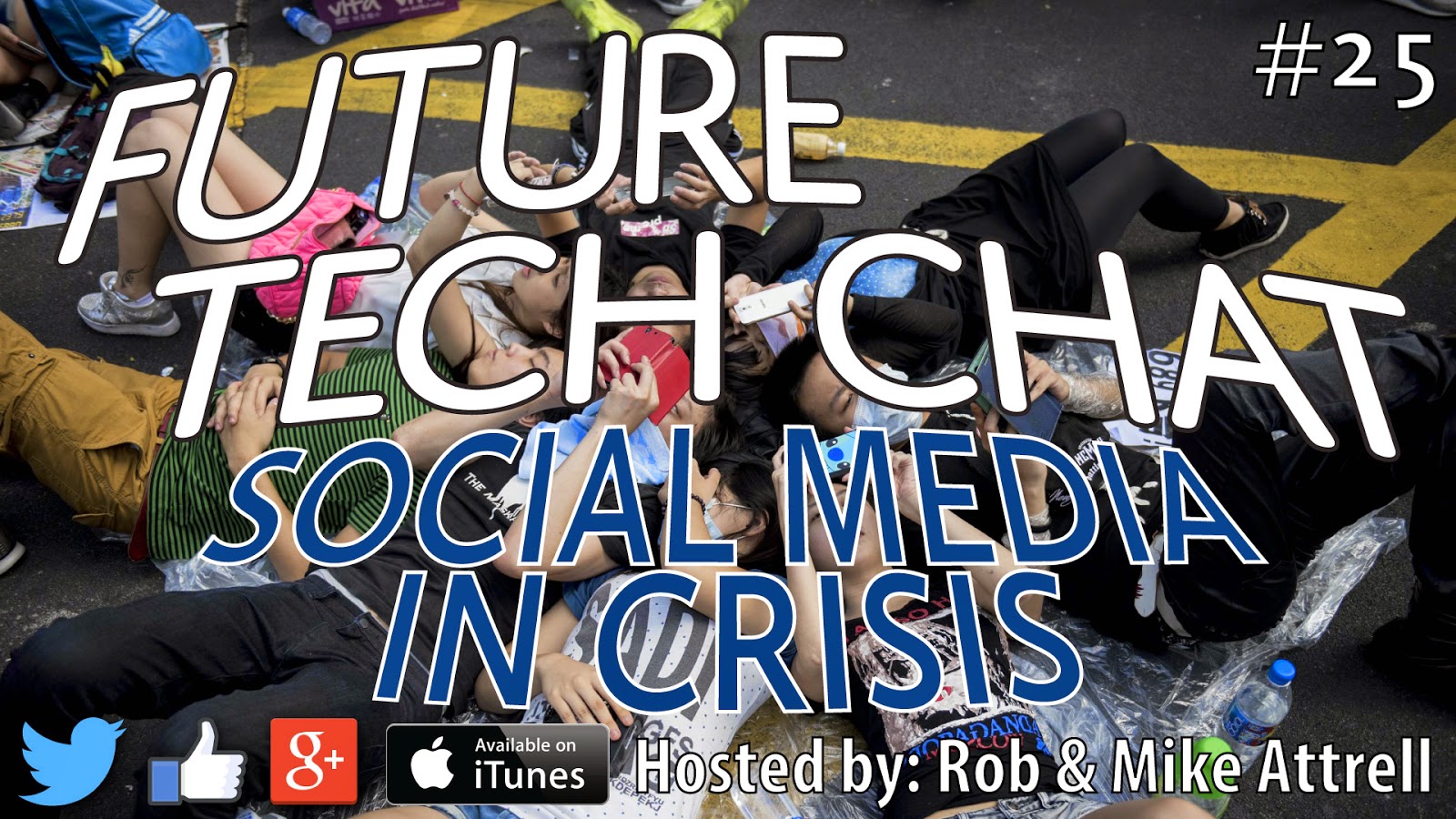We went topical this week on +Future Chat, discussing how social media can be used and mis-used in crisis. Between protests, emergencies, and natural disasters, there are innumerable reasons social media can be an incredible way to connect people when they need it most.
Future Tech Chat #25: Social Media in Crisis!function(a){var b=”embedly-platform”,c=”script”;if(!a.getElementById(b)){var d=a.createElement(c);d.id=b,d.src=(“https:”===document.location.protocol?”https”:”http”)+”://cdn.embedly.com/widgets/platform.js”;var e=document.getElementsByTagName(c)[0];e.parentNode.insertBefore(d,e)}}(document);
Category: Blog

Future Tech Chat #25: Social Media in Crisis

Ottawhat #23: Rob Parungao
Check out this week’s episode of the Ottawhat? podcast. New every Thursday!
Attrell Update – Canada
This week on +Attrell Update, I share some of my thoughts about yesterday’s attack. The scene in Ottawa was very calm and a solemn version of normal. I love this country.
I took a lot of time to reflect and really think hard about what I wanted to say and show you. You’ll notice my video on Canada Day captures both the War Memorial, this city has many beautiful landmarks that are meaningful to me in a number of ways. Thank you for watching and listening.
If you want to keep up with these videos, click on the “i” in the top right of the video and subscribe!

Fake It Show #4: Interview with a Maddox
I had +Nick Maddox in the Fake It studios this week, to talk about his big move from Ontario and grad school, to Alberta and technical college. We also discussed the keys to successful relationships.
Fake it Show #4: Interview with a Maddox!function(a){var b=”embedly-platform”,c=”script”;if(!a.getElementById(b)){var d=a.createElement(c);d.id=b,d.src=(“https:”===document.location.protocol?”https”:”http”)+”://cdn.embedly.com/widgets/platform.js”;var e=document.getElementsByTagName(c)[0];e.parentNode.insertBefore(d,e)}}(document);
An Open Letter to Canadian Internet Service Providers
Dear Internet Service Providers (ISPs),I’m going to attempt to remain as calm as possible throughout this letter, but honestly we’ve all had enough of your ridiculous policies and price gouging.I’ve written and talked about this problem many times before, and 5+ years of crazy and punitive changes to your wireless and home internet packages has left me shaking my head in disappointment at your terrible treatment of your poor customers who don’t know any better.A little about me, I’m not really what anybody would call a “heavy” data user, I just enjoy using technology to its maximum potential in my everyday life. I take pictures and video with my camera phone pretty much every day. I watch shows like the Daily Show and the Colbert Report 4 days a week on my morning and afternoon bus commute. I pay Apple for the privilege of streaming a reasonable amount of music in my iTunes library to my cell phone, tablet and laptop. I also listen to podcasts, 1-2 per day, that have to be downloaded. I download apps too, but certainly not a crazy amount. That being said, ALL of your data calculators are completely unable to accurately predict my wireless data usage, coming in anywhere from 5 GB to 12 GB a month (usually I max out the meter).I’m also pretty technically savvy, and use social media. This means that I back up the photos and videos I take to Dropbox and Google Photos, I check Twitter, Facebook and Google+ a normal amount, and man a few social accounts for projects I’m working on or involved in.I am certainly an advanced mobile user, but I don’t think my Internet usage should really fall too far outside the mainstream if not for your outrageous mobile service plans which gouge customers like me who simply want to connect to the internet at its full potential.Here is a breakdown of my mobile phone usage for September 10 – October 9 (this is now a seemingly typical month):Minutes used: 33:41 mm:ssMessages sent: 39 msgsData consumed: 35.91 GBI recently renewed my plan which I originally got in 2008 which I have been clinging to for dear life, which includes 150 anytime minutes (unlimited eve/wknd), unlimited SMS messages to North American numbers, and what was at the time called “Unlimited Mobile Browsing”. At the time, this was a $5 add-on with my new Sony Ericsson flip phone. I LOVED that phone. Since signing up for this plan, I have moved to a smartphone, and renewed the plan this summer while getting a Nexus 5 for about $60 after rebates.Now, for people reading this who aren’t familiar with my story, you would probably expect that I’m probably paying a lot of money for my plan that can get me 36 GB of data. Using that much data on even the most generous Rogers data plan would cost you well over $300. But in 2008, my plan cost me only $40 (+ 13% HST) per month, and that’s how much I’m paying today. I do the math every 6 months or so and no matter how you slice it, it is worth keeping this plan and buying new phones outright than to switch to a punitive new plan and suffer through curbing what isn’t really extraneous mobile data usage.Companies like you (Rogers, Bell and Telus) have bought up or created smaller brands to attempt to appeal to customers trying to save money, but all you really do to those customers is give them even less than your major brands will give them. Koodo, Solo, Chatr, Fido, Virgin, etc., are no better deals than your major brands when it comes to the tiny amounts of data they get. Even if you buy a plan from Rogers with 30 GB of data (designed allegedly to be shared between a large number of phones/people), that still isn’t enough data for one person with my non-excessive browsing habits.
Good old 2007! I accept that I may be in a particularly unique situation with my high data use in 2014, but this is the way things are going with the internet. We need to be able to transfer data quickly and efficiently on mobile networks. And it’s not like I’m not suffering consequences of being on a grandfathered plan from when the iPhone was a new product running on the EDGE network. I don’t have visual voicemail, which is standard on the new plans. I don’t have access to LTE data, and my upload speed is throttled particularly harshly (I’m not sure if my download speed is throttled, but it’s about an order of magnitude faster than the upload). I can’t tether my tablet or laptop to my phone’s internet connection unless I jailbreak my phone, and I prefer to keep my software up to date than to jailbreak these days.
These policies and tiny data caps are not unique to cellular carriers and networks. DSL, Cable and Fiber internet customers also suffer through some extremely stingy plans. The plan I have been on for the last few months for Cable Internet is fairly expensive, but at least it comes with unlimited data transfer. Before that, for 6 months I suffered through a new cable and internet package that included 150 GB of data per month. That was torture, as I like to download beta software, music, and other media, and my fiance and I love Netflix and basically any other service that means we don’t have to sit down in front of our TV on the hour to watch whatever show happens to be on. I was tiptoeing around to keep under the 150 GB cap for 6 whole months, and it was painful.Right now, you might be thinking “Boohoo, you get what you pay for”, and that I shouldn’t be complaining about something that’s cheap. I understand why you might say that, and I’ve always been very open about the fact that if I’m getting something worthwhile, I would be more than happy to pay a premium for that.However, as is evident in the mobile space, and to a lesser extent in the home internet world, data rates (especially for overages) are completely outrageous and not what any normal person would consider reasonable. Even if we pretend that I’m going to pay for Rogers’ 30 GB plan on mobile (which is $250 a month), that’s not enough data for my typical needs. Beyond the data usage of any mobile data plan, additional data costs $10-15 dollars extra per GB. It has been calculated that the highest estimated cost to an internet provider for a GB of data transfer is about $0.08. In the home internet world, costs are even lower than that, but you can still expect to pay anywhere from $1-5 per GB for overages. This, plain and simple, is price gouging.Now, I hear your customers reading this shouting “Why don’t you just go to Wind, or Mobilicity?” I understand where those people are coming from. To put it simply, I have tried Wind, and though their service is fairly good, the internet is slower than what I would be getting on the Rogers network even on 3G, and if I end up outside their coverage zone, rates skyrocket to as high as $50 a GB, or basically what any customer who is using pay-as-you-go data on Rogers would be using. It also doesn’t save me money from my current plan, but if something ever happens to that plan, I would be going to Wind in a heartbeat.I know that a lack of competition is what is stopping you from lowering your prices. I know this because there are examples all over Canada of people competing with you in small markets, and you have lowered your prices or changed pricing structures in those areas. In Saskatchewan and Manitoba, for instance, you offer very cheap plans with 5 or 10 GB to match the offerings of provincial carriers like MTS and Sasktel. In Ontario, when companies like Teksavvy started buying bandwidth from you in bulk and reselling it at lower cost, you made a plan that you don’t advertise publicly except to TekSavvy customers. The plan very closely resembles the standard TekSavvy plan, and you can make offers like 6 months free on a 2 year contract to sweeten the deal and keep little guys out of the market.Never mind the fact that you 100% pay your Rogers technicians more for service calls to Rogers customers than for TekSavvy service calls, which mean that TekSavvy customers end up waiting days or weeks for technicians who are prioritizing Rogers accounts. That is a conflict of interest if I have ever seen one. If somebody gets fed up with this seemingly bad service from TekSavvy, they can call Rogers, get the same tech out the next day to set up their Rogers internet, and pay more for it. This process is absolutely criminal and I can’t believe the CRTC lets you get away with it year after year.Please, please, PLEASE change your business practises. I am one of 35+ million Canadians who is fed up with the current state of internet service in Canada. I want to buy mobile and home internet from you Rogers, Bell and Telus. I just want to pay a fair price for the data I use, let you take home some profit, and call it a day. That’s all any of us want. But what you’re doing to your loyal customers simply won’t last, and I implore you to give the people who love the work you do pushing internet technologies forward what they want. Plans with more data. Doubling the prices of your plans and offering unlimited minutes across Canada and unlimited SMS is not what customers want, as research has shown over and over again in the last few years. Run a legitimate business, that’s all I’m asking.Thank you,
Rob AttrellA concerned citizen.
Sources:
http://www.forbes.com/sites/tristanlouis/2013/09/22/the-real-price-of-wireless-data/
Attrell Update – Lying
This week on +Attrell Update, I discuss lying in our culture, and how important the truth is to me. It’s very important to be honest, and to be true to yourself.If you want to keep up with these videos, click on the “i” in the top right of the video and subscribe!
Earlier this week, +Stephanie Attrell told me what she is thankful for.

Future Sci Chat #10: Health
On +Future Chat this week, we went all in on health. Things like homeopathy, vitamin supplements, and extra strength medicine are all on the docket for discussion. We also talked about death in the aftershow, which was a very interesting discussion.
Next week, we will be taking a little break, so tune in on October 25th for a new episode!
Future Sci Chat #10: Health!function(a){var b=”embedly-platform”,c=”script”;if(!a.getElementById(b)){var d=a.createElement(c);d.id=b,d.src=(“https:”===document.location.protocol?”https”:”http”)+”://cdn.embedly.com/widgets/platform.js”;var e=document.getElementsByTagName(c)[0];e.parentNode.insertBefore(d,e)}}(document);
Generation Why? (Part 3)
In Part 1 and Part 2 of this story, I talk about my journey from post-secondary education to getting started with trying to make a career. This is Part 3.
As I talked about earlier this week, I am a huge believer in the concept of basic income. This is the idea that everybody in a given political system (city, county, province, country, etc.) would get a government cheque with an amount that would keep the poorest among us above the poverty line.
If you’re asking how a government could possibly afford this, it wouldn’t happen all at once. The program would obviously be a little bit more complicated than just giving everybody free money. Personal taxes would probably go up a little bit if you make more than the basic income amount. Businesses would have the opportunity to restructure their salaries so their employees would make about the same amount of money overall as they did before, and the corporate tax rate would also be raised since these businesses would now have some former salary that is no longer going to employees. Parents with children under 18 would receive additional benefits to keep their families above the poverty line, so that we could get a real chance at making sure no crimes are committed simply because somebody is poor. The economic stimulation from this system would undoubtedly be unbelievable, as suddenly the resources needed to run homeless shelters, hospitals, police forces, payday loan centres, etc., would suddenly drop precipitously.
There has been quite a bit of talk lately about the fact that automation in first world countries and factories around the world mean that human workers will come to be relied upon less and less. However, profits from companies that turn to automation won’t slow down, if anything they will become more efficient and make even more money. All of this could mean that we will have millions of people with no work to do, and corporations making incredible amounts of money (something that you will note is already happening in the US, and almost certainly in other places). Executives are making hundreds or thousands of times as much as their lowest employees, at a pace that is completely unsustainable in the long term. Increasing corporate tax rates for corporations that are innovative and forward-thinking enough to stay ahead of the curve on automation will still make more money, but they will pay a higher percentage of tax when their revenue gets into the hundreds of billions of dollars. This tax revenue can then be redistributed to former workers and those unable or unwilling to work to keep them from burdening society, but also keep them injecting money back into the economy.

Humans need not apply. At a certain point in the future, not everybody will have to work. The concept of the 40-hour work week is something that was made up by Henry Ford (it actually used to be higher than 40 hours on assembly lines, before child labour laws were a thing) when he decided to give people more time off work without a cut in pay so that people would be able to go out and actually have time to spend the money they were earning. If we took this even further, some people could go down to something like 15-25 hours a week, and still earn enough money during that time to make a comfortable living. Money itself is a human construct, and it’s becoming an increasingly virtual one. Estimates put the amount of cash in circulation at only about 10% of the world’s wealth. Saying that there isn’t enough money to give everybody enough to avoid malnutrition or starvation or disease or homelessness just isn’t realistic. In North America we throw away about half of the food that is produced because it goes bad or people will not eat it or it can’t be sold. Grocery stores do this, throwing away food after rendering it inedible while the homeless peddle for change.
What are we doing to our brothers and sisters?
Now, back to my generation. I talked yesterday for a bit about the concept of giving new graduates a stipend for (about) 6 months of salary to get them started on the right foot. If new post-secondary graduates didn’t have to worry about money fresh out of school, don’t you think there is SO much they could accomplish. If I had had 6 months paid for me out of school with the freedom to job hunt without fear of not getting a return on investment (over $60000 for 5 years of school), there would have been much less pressure to find a job fast, and I could think about what I really wanted to do with my life, and pursue that passion.
At this point, all things considered, my pre-career has been pretty great. I have been working a lot of fairly short, term contracts, with the theory being that I’ll eventually work my way into something permanent where I actually have a smidge of job security. University, though I enjoyed it greatly, did very little to prepare me for the concept of going out into the world and making myself known. I gained a modicum of notoriety at my school in my department, but that would only be useful if I had wanted to continue down the academic path. My options were severely limited after that point, and I had effectively no contacts in industries, because I was doing fundamental research with basically no real-world usefulness just yet (which I was fine with, but it didn’t help me out in any way career-wise).
It would be really great if the public service remembered the humble beginnings from whence it came. I have a lot to say about the nature of the government hiring process and the stress it puts on new hires trying to figure their lives out, but I think I’m going to save that for another time. All I have to say is that when you prioritize cheap labour with the bare minimum qualifications, you get what you pay for. Outsourcing your workforce to temp agencies might save you money in the short term, but when young people see how much easier life is in the private sector, you’re going to have a lot of difficulty attracting fresh faces who’ve already seen the brighter light.
University taught me a lot, but one thing it failed to prepare me for was the size you feel when you doff the ivory towers of your post-secondary institution and proceed on your own into the world. I know I have a lot of offer the world, and I’m going to get there one way or another. I’ll just take it 6 months at a time for now.
This concludes my thought-splosion on the state of affairs for students after university entering the workforce. Check out Part 1 and Part 2 from earlier this week as well.

Ask Rob #2: Ebola
This week on Ask Rob I address a question from Maureen about Ebola. It’s a scary disease that’s having its biggest outbreak ever this year. Here are some links where you can check out more information:http://www.who.int/mediacentre/factsheets/fs103/en/
http://www.cdc.gov/vhf/ebola/
http://www.doctorswithoutborders.org/our-work/medical-issues/ebola
http://www.vox.com/2014/10/9/6905347/too-afraid-to-ask-about-ebola-virus-outbreak-symptomsKeep your questions coming at [email protected] or click Ask Me Something on this blog to submit your question.You can also subscribe to my YouTube Channels or podcasts if you’re interested in learning more. Check it all out at robattrell.com!










